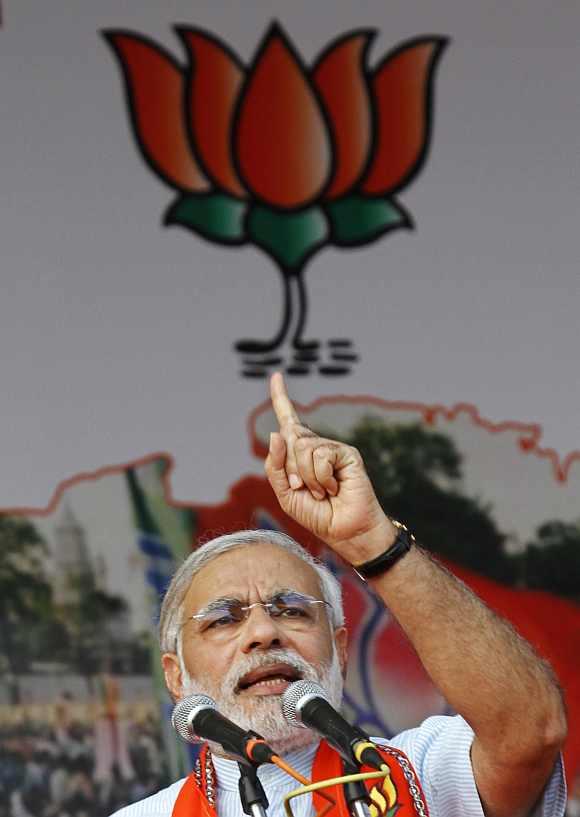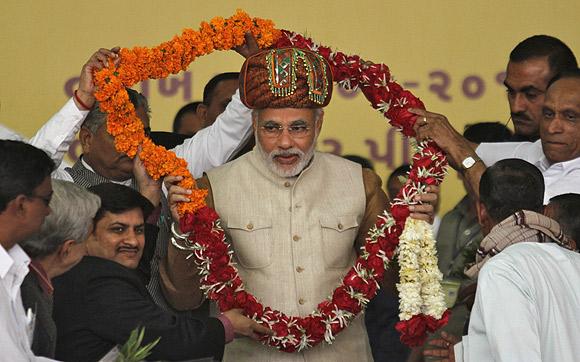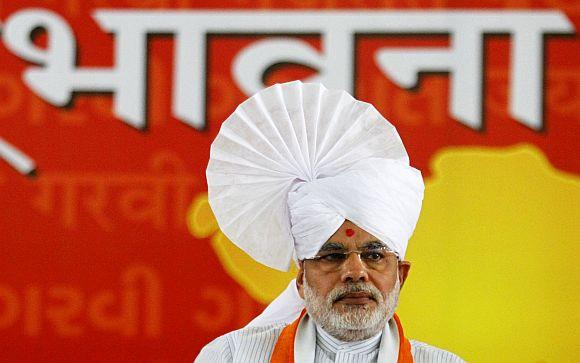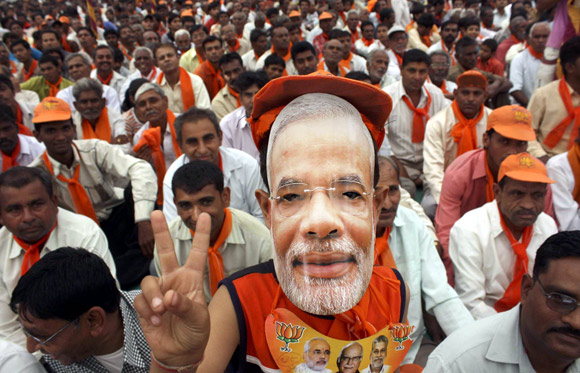 | « Back to article | Print this article |
M for Modi and M for Money
Rediff.com's Sheela Bhatt, who is travelling around Gujarat, lists the factors that will help Chief Minister Narendra Modi likely win the state election.
A real estate agent who sold a valuable track of land to Bollywood superstar Amitabh Bachchan in Gujarat's capital Gandhinagar told Rediff.com, "When we close our eyes and think of (Chief Minister Narendra) Modi we see money!"
That is the level of challenge and social-cultural complexity the Congress continuously confronts in Gujarat. Notwithstanding its media campaign, the Congress has not been able to give a convincing assurance to voters this election that its government will help middle-class Gujaratis explore opportunities and earn money while keeping the law and order situation under control.
Of the 37.8 million Gujarati voters 20.4 million are below the age of 40. A little over 1.2 million voters are between the ages of 18 and 19. They want stability and a sturdy leader.
Please click NEXT to read further...
2012=1998
By all accounts, Narendra Modi is trying to turn his predecessor Keshubhai Patel's rebellion into a 1998-type situation.
In 1998, the Bharatiya Janata Party was divided between the Hajuria and Khajuria groups after Shankersinh Vaghela's rebellion against the party. The election that followed was a three-corner fight.
The BJP won 117 seats in that election and 44.81 per cent of the votes polled. The Congress won 53 seats and secured 34.85 per cent of the vote.
Vaghela's newly-formed party, the All India Rashtriya Janata Party, obtained an impressive 11.68 per cent votes, but wononly four seats.
Vaghela and the Congress combined won more votes, but the BJP was elected to power. Modi would employ all the tricks of the trade to cut into Congress votes with the help of 'Independents' and vote-spoiler pressure groups.
The 2012 election will break all records of 'Independents' trying their luck in Gujarat's 182 assembly seats. Some of them will be proxies for Congress candidates, but many more will be helping the BJP.
Due to the presence of these 'Independents' in the fray, the victory margins will be low in many seats.
Modi will be the ultimate victor if he can bust the myth of the Patels and 'Patelism' in Gujarat politics. The issue has far reaching implications for Gujarati society.
The Patels are in real estate, agriculture, textiles and small-scale industries. Their money power and hired muscle power has influenced Gujarati society beyond limits.
Modi seems to be the only Gujarati leader in recent times who may or may not bust the Patel myth. This election will tell us if he succeeds or not.
Leuva and Kadva Patel votes number less than 6 million, but they enjoy a disproportionate influence if compared with their vote share in every field.
Modi will be watched closely by non-Patel voters in this election to see how he takes on the onslaught of the Leuva Patels in Saurashtra.
Please click NEXT to read further...
Modi, the flexible
Narendra Modi, the so-called strongman, is as flexible and liable to make compromises as any other opportunistic Indian leader while making political decisions.
He casts aside his ego and dislikes while selecting BJP candidates. That goes in his favour.
The Modi factor is not bigger than the caste factor.
Taking into consideration Keshubhai Patel's direct challenge to him in this election, Modi has given 32 per cent of BJP election tickets to Patels, out of the 177 seats the party will contest.
Modi, this decision reveals, takes Keshubhai's challenge seriously.
Modi's concern for the final outcome is also seen in his decision to give 89 sitting BJP MLAs tickets, dropping only 27 current legislators.
Like the 2007 election in Gujarat, the 2012 election is also being fought, essentially on the basis of caste, but Modi wears a different hat.
In the Patel-dominated public discourse, Modi's unannounced image is that of a strong leader who tries to take under his wing 'non-Patels' including 'anti-Patel' votes.
Also, in the last five years, Modi has hardly made any political errors that could dent his carefully constructed public image among the urban middle class, especially amongst the youth and women voters. No major corruption cases have been exposed.
Modi tried to measure the Hindutva versus secular temperature through his Sadbhavana meetings and quickly decided to stick to his already marketed image.
In the words of a BJP leader, his Hindu voters consider him, "A capable Hindu leader of Gujarat who is taking development to the next stage."
Hindutva emotion is currently not stark in Gujarat's urban areas as it was in 2002. The Vishwa Hindu Parishad and many Rashtriya Swayamsevak Sangh leaders have been -- covertly and overtly -- helping Keshubhai Patel. But they won't be able to strike a chord among voters by whipping up Hindutva.
Even Modi is not in position to exploit Hindutva. Gujarat politics has internalised the issue. The Hindutva emotion is under the surface and the frenzy is absolutely absent.
Modi had planned to give tickets to Muslim candidates in constituencies like Bhuj in Kutch, Vagra near Bharuch, Khadia and Jamalpur in Ahmedabad. But he played it safe yet again.
Modi and the BJP have not given a single election ticket to Muslim candidates, which reveals that Modi is not as daring a leader as he is often projected to be.
Please click NEXT to read further...
Modi, the loner
Narendra Modi is not dependent on either the media or his party. The Gujarat media, largely, is against Modi without creating much impact so far.
Modi has cut to size all his ministers and BJP leaders. They have been dwarfed even though they have spent 30 or 40 years in politics. These leaders are not written about in any election.
For the last decade, the BJP and Modi have had different identities. The Patel factor is anti-Modi, but not really anti-BJP.
Modi is seen as a 'lonely man at the top' by many voters.
Many of his loyal voters and believers claim Modi is lucky for Gujarat because the monsoon has been normal during his tenure.
Now, that is an unbeatable perception for Modi's challengers.
Please click NEXT to read further...
Gujarat versus New Delhi
The Congress has failed to provide collective or individual leadership to take on Modi. The Congress has suffered a setback in recent weeks after a confident run.
The Modi government is being seriously challenged only at the micro-level in towns and villages.
In Surat, from where this report is being filed, what is unfailingly noticed is the absence of Rahul Gandhi, the future of the Congress, from the Gujarat battlefield.
Many people see Rahul's absence as a clear indication that the Congress leadership has given up the Gujarat election as a lost cause.
This perception, spread by BJP leaders, is not bought by everyone. During visits to the Congress's main election office and local offices, one can see hope about the party improving its electoral position.
"Election surveys on television have impacted our morale," Congress leaders admit. The television election surveys have all predicted a victory for Narendra Modi and the BJP.
"The final results will not be as bad as the BJP projects," one Congress leader told me.
Congress leaders try hard to dismiss the perception that the Congress would like Modi to win so that Rahul Gandhi will have an easier run in the Lok Sabha election. Pan-India, minority voters, it is felt, will rally behind the Congress only if Modi is in the fray.
105 or 125?
In the last 72 hours of travelling through Gujarat, one hears only one question: Will Modi win 125 seats or 105 seats?
Please click here for Part II: Five factors that go against Modi




